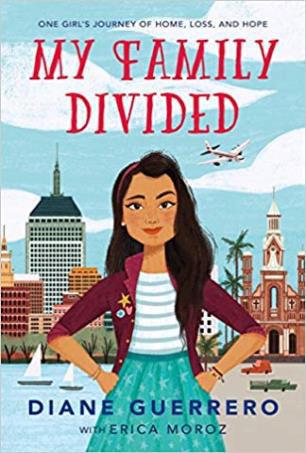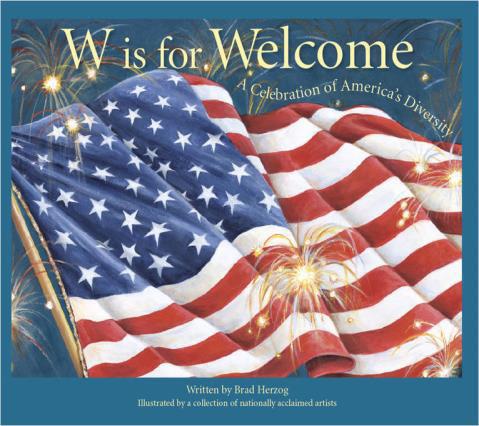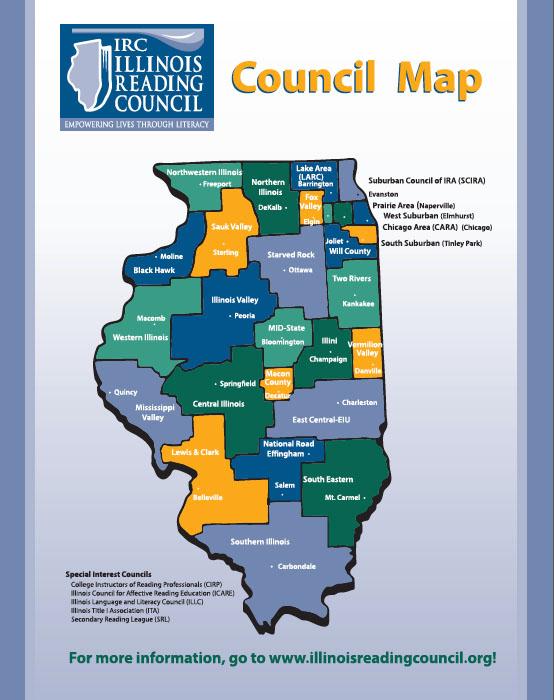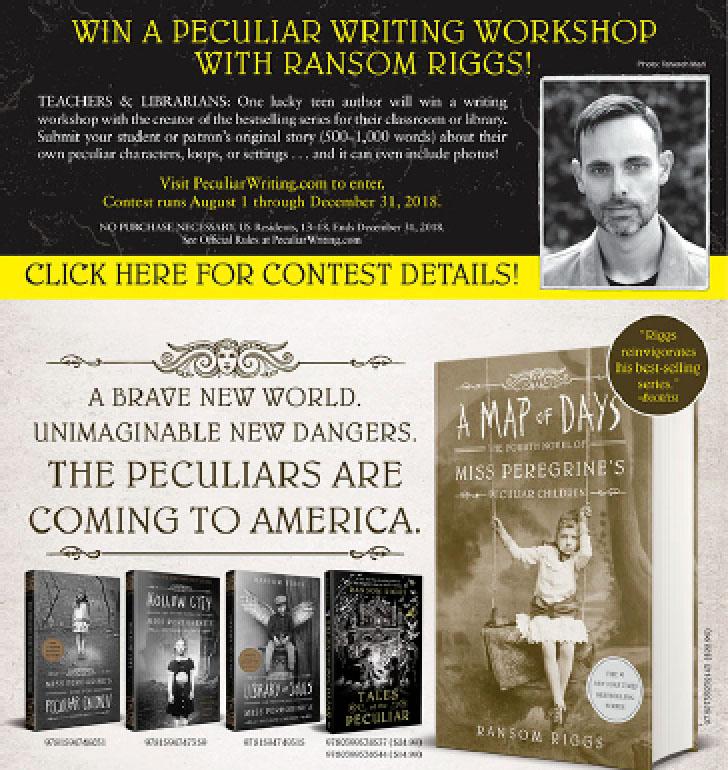|
|
Welcome to
iCommunicate, IRC's monthly e-newsletter! Here you will learn, share, and enjoy information on timely topics and cutting edge projects. We'd love to hear your thoughts. Please contact us with your comments, suggestions, and ideas at
[email protected].
|
|
From the Family Literacy Bookshelf
By Barb Ashton, IRC Family Literacy Committee Chair

Pictures and news stories of immigrant children being separated from their parents at America's border, being detained in cages at makeshift facilities, and their parents sent to detention facilities or deported back to their country of origin filled our news media this summer and continues today.
My Family Divided by Diane Guerrero is a memoir of the actress from "Orange Is the New Black." She tells of her harrowing experience of coming home from high school one day to an empty house as her parents and brother were taken earlier in the day by immigration officers.
Although she was born in the United States, her parents remained undocumented immigrants. Her parents had also overstayed their visas in spite of failing in their continuous efforts to become legal citizens.
Ms. Guerrero lived in fear of being deported or being sent to foster care. However, friends and neighbors took her in and helped her to finish high school and college. Ms. Guerrero describes the emotional and financial struggles she faced while trying to live a life on her own. She also describes her feelings of guilt, depression, and bodily harm. While her parents have never returned to the United States, she does take periodic trips to visit them in Colombia.
Ms. Guerrero states that she wrote this book for children ages 8-12. She hopes that her story will give some comfort to those immigrant children who are experiencing many of the same things she did. She also hopes that reading about her experiences will perhaps motivate a child to become an immigration lawyer, an elected official, or an educator who can teach and inform others that the "American Dream" can be achieved.
At the end of the book Ms. Guerrero gives a wealth of resources that will help you learn more about the immigration reform debate, getting involved, and support for families. The adult version of this book by Diane Guerrero is
In the Country We Love: My Family Divided.

The Devil's Highway by Luis Alberto Urrea is a true story about the Mexican migration across America's southern border. It's also about the tragic story of the 26 men known as the Wellstone 26 who attempted to cross America's southern border and enter into the desert of southern Arizona or "The Devil's Highway." While hoping to seek a better life and secure a job to earn enough money to bring their families to America, these 26 men were willing to risk their lives to achieve the "American Dream." They also experienced hypothermia at night, along with very little food and water and inadequate clothing. As the journey continued several of the men became weak, sick, and died. Out of the 26 men who braved this journey only 12 survived and the 14 who perished became known as the Yuma 14. Although the story of the 26 men has been documented in the news media, Mr. Urrea introduces the reader to the small towns on the border, the hopes and dreams of the illegal immigrants who put their faith and trust in the guides or coyote gangs who promised to take them across the border to America. However, in this story, the coyote led the men to a journey of hardship, disappointment, and death.
The Devil's Highway is a story of fortitude and courage. This book would be a good read for your high school students, book club, or just for your personal knowledge of our border situation today.
 W is for Welcome: A Celebration of America's Diversity by Brad Herzog is an ABC book that not only touts immigration, but also gives a picture of the paths various immigrants took who came to America and helped to make America the country she is today. The letters of the alphabet are matched with beautiful illustrations by various well known artists, and short written text, and explain the events and contributions many immigrants have made here in America. Some examples are: the pilgrims who sailed on the Mayflower, the Irish and Chinese immigrants who helped to build the Transcontinental Railroad, Levi Strauss, Albert Einstein, John Muir, and Irving Berlin.
W is for Welcome: A Celebration of America's Diversity by Brad Herzog is an ABC book that not only touts immigration, but also gives a picture of the paths various immigrants took who came to America and helped to make America the country she is today. The letters of the alphabet are matched with beautiful illustrations by various well known artists, and short written text, and explain the events and contributions many immigrants have made here in America. Some examples are: the pilgrims who sailed on the Mayflower, the Irish and Chinese immigrants who helped to build the Transcontinental Railroad, Levi Strauss, Albert Einstein, John Muir, and Irving Berlin.
The book also touches on poverty, the complicated process to naturalization, and the privileges of citizenship. There is a wonderful teacher's guide and activity sheet to go with the book. It can be reached at www.sleepingbearpress.com. Although the book is written for middle grades, there are parts of the book that teachers/librarians can share with students of all grade levels.
|
|
Teachers in the Trenches: Stuffed Animal Sleepover
By Tambree Krouse
Back to school time and in the library, students are eager to return their completed summer reading challenges. A glance at the names on the papers and I see a list forming of students who love reading; students for whom not reading is an unbearable thought. The names I don't see are the names of students for whom I was hoping the BINGO-based summer activity would inspire to spend some much needed time reading. This was the scenario that has played out in my K-12 library for several years.
Two years ago I wanted to try something new, a more direct way to reach those students who would probably not read. Make them want to read at least a little something, which would be more than they would read during the summer. The plan? A stuffed animal sleepover in the school library. With the advantage of a small school -- two sections per grade level -- twelve students were selected based on the classroom teachers' and my librarian opinion that the students might not spend much of the summer practicing their reading skills without some little nudge. Just before school got out for the summer, I called the parents of three students in each section of kindergarten and first grade to explain our project and seek their approval for the student to participate. Then I sent home invitations to the stuffed animal sleepover. The students brought in their favorite stuffed animal to spend the night in the library. If a student forgot, the student could choose one of our stuffed book characters. The students also completed an information sheet about their stuffed friend.
The stuffed animals were gathered with their information recorded on index cards, and the adventures began! A Girl Scout Troop helped me take photos of the stuffed animals after school. With each scout in charge of two stuffed animals and the owners' identities known only by me, we started posing and snapping photos at school, and around the town.
The next school day the students were greeted by the stuffed animals, and a note which told that the animals wrote about the adventure and asked the librarian to send the student letters during the summer. The students also received a small photo album in which they would be able to collect the photos throughout the summer.
Each week during summer vacation the student received a short note from the stuffed animals, a photo, a paper slip with a caption of the photo, and a paper mini-book or two. The advantage of a small town is that I saw most of the students at some point in time during the summer and asked what they thought of the letters. They loved them and couldn't wait to read about the stuffed animal's adventure. That's right - they were reading! Happy reading to us all!
Tambree has been the district librarian at the Edwards County School District in Albion for 25 years. She is the president of the South Eastern Reading Council, and loves finding ways to bring the joy of reading to others.
|
|
Reading Strategy of the Month
By Joyce Jennings, CIRP Member

Four-Step Strategy in Inferring Word Meanings from Context
This strategy is based on one developed by Michael F. Graves. The steps utilize the terminology from remote controls.
Step 1: Play and Question
- Read the text carefully.
- Frequently ask yourself if the text makes sense. If not, go to step 2.
Step 2: Slow Advance
- When you come to a word you don't know, slow down.
- Read the sentence containing the word again, looking for clues as to what the word means.
Step 3: Stop and Rewind
- If necessary, go back and reread the sentence or two before the one with the unknown word, looking for clues that help you figure out what the word might mean.
Step 4: Play and Question
- When you can make a guess of what the word might mean, substitute your guess for the difficult word and see if it makes sense.
- If it does, keep on reading.
- If it doesn't, stop, rewind, and try again.
- If it doesn't work after the rewind, ask someone about the word, look it up in the dictionary or thesaurus, or just continue to read, understanding the passage as well as you can without knowing the exact meaning of the word.
Teachers should model the strategy during the introductory stage, using a think-aloud technique. A strategy chart is helpful.
Adapted from Graves, Michael F. (2006).
The Vocabulary Book: Learning and Instruction. Urbana, IL: Teachers College Press.
|
|
IRC Executive Committee Spotlight
By Janel Sebeny, IRC Past President

I am currently an 8th grade Literature & Composition Teacher in McLean County District Unit 5 located in Bloomington-Normal. I have been teaching since 2000.
I got involved in a local council, MID-State Reading Council, my first year of teaching. I attended meetings and programs, then became a chairperson for their annual Carnival of Reading. Shortly thereafter, I was part of their Executive Council and eventually President. Because of my positive experience, I wanted to do more across the state of Illinois so when nominations for officers in IRC came around as I was ending my presidency for MID-State, I went for it!
Go for it! It has been one of the most rewarding experiences in my professional life.
"Reading changes your life. Reading unlocks worlds unknown or forgotten, taking travelers around the world and through time. Reading helps you escape the confines of school and pursue your own education. Through characters - the saints and the sinners, real or imagined - reading shows you how to be a better human being." -- Donalyn Miller, The Book Whisperer: Awakening the Inner Reader in Every Child
|
|
IRC Spotlight on Region 10
By Cindi Koudelka IRC Region 10 Director

Region 10 features our statewide councils. What is especially exciting about these councils is
that they each focus on a special interest. Becoming a member of one of these councils alongside your geographic council brings you the best of both worlds: local events as well as events and newsletters on topics that best meet your needs.
CIRP (College Instructors of Reading Professionals) accepts
applications for Student Conference Stipends for education majors who attend the annual IRC Conference. Applicants must be full-time education majors attending a college or university in Illinois. Up to ten $100 stipends will be awarded. Additionally, they offer great events throughout the year that support teacher educators. The College Instructors of Reading Professional (CIRP) launched the first Early Career Event on April 28, 2018. This event was to celebrate Preservice teachers, who want to focus on literacy, by awarding them a free yearlong membership into the Illinois Reading Council (IRC). This award is in line with our efforts to increase membership of reading professionals and literacy leaders in the Illinois Reading Council (IRC). CIRP was pleased to award the membership to students from the following Universities: DePaul, Judson, Loyola, Lewis, Roosevelt, and Southern Illinois Edwardsville. In addition to the student awards, CIRP gave an award to Dr. William Teale, posthumously, for his work with preservice teachers. His wife and colleague, Dr. Junko Yokota accepted the award in his honor. This annual event is to be known as the Bill Teale Early Career Event going forward. Laura Beltchenko gave an inspirational keynote address to the preservice recipients followed by a light lunch and discussion.
ICARE
(Illinois Council for Affective Reading Education) is partnering with some of the wonderful authors/illustrators in the Society of Children's Book Writers and Illustrators to support a new initiative called Read Local. The authors are interested in collaborating more with teachers, librarians, and students in Illinois, and we will be working to support their efforts. Stay tuned for more details on this.
ILLC
(Illinois Language and Literacy Council) offers events and information throughout the year to support literature learning. The highlight of their year is the Young Author's Conference for students in May.
ITA (Illinois Title I Association)
supports and fosters the interests of Title I teachers and all individuals with an interest in literacy throughout Illinois with research and the latest Title I information.
SRL
(Secondary Reading League) focuses on Adolescent Literacy with Newsletters, Twitter chats, and their famous Day of Reading event. This year's event will be held on November 30 and will feature Cris Tovani.
|
|
Literacy Links
By the IRC Educational Media Committee
Take a moment to review some of the Literacy Links provided by the IRC Educational Media Committee to help Illinois educators in today's classrooms. These links and past links will be available on the IRC Website under "Literacy Links" on the homepage.
Assessment Resources
This free, online assessment tool is very similar to Kahoot. It has more options because it allows questions that have multiple correct answers and questions with numerical responses and handwritten answers. It is a great tool for formative assessment in all subject areas.
Video Resources
This free online tool allows students to create videos to share with the teacher as well as other students. It allows students to be creative and show what they know in a short video. This is a great tool for all ages.
Web 2.0 Resources
This free and easy to use tool is used to create an online backchannel for discussions. This tool allows the teacher to make the backchannel password protected, Google search protected, and mute or delete students from the discussions, if necessary. This is a great alternative for Todays Meet that is no longer available.
|

|
|
| |
|